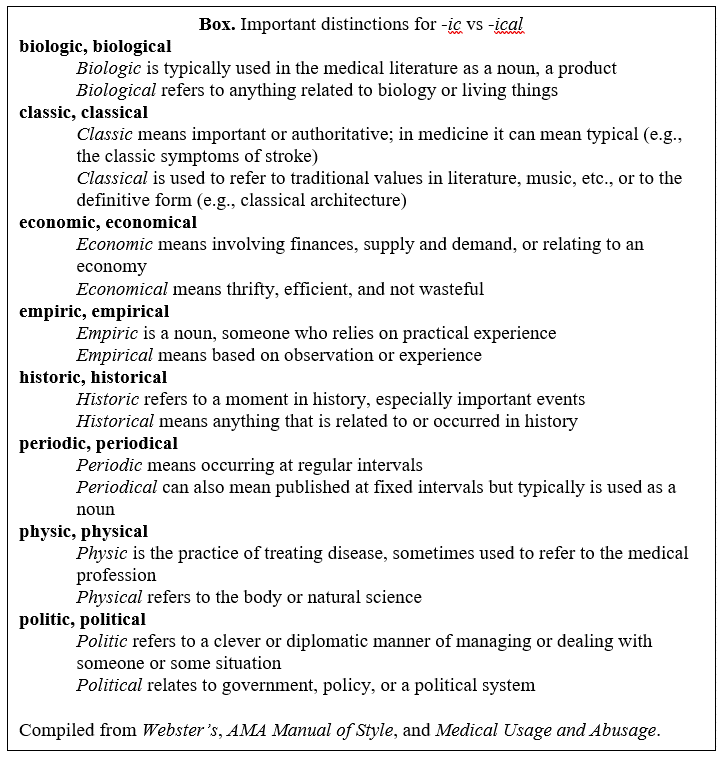“The difference between the almost right word and the right word is really a large matter. ’tis the difference between the lightning bug and the lightning.” –Mark Twain
Many terms in scientific communication end in the adjectival suffix “-ic.” Or is it “-ical”? Yes and no. And does it matter?
Both -ic and -ical can be appropriate suffixes for adjectives. According to the current edition of the AMA Manual of Style, often the “-ic” and “-ical” forms have the same meaning, for example, anatomic and anatomical, neurologic and neurological, and physiologic and physiological. However, there are times when the suffix may change the meaning of the word and it is important to use the correct form. Once the suffix use is sorted, it is also preferable to be consistent throughout a document.1
AMA style guidance on this topic has evolved over the years. The 10th edition (as well as the 9th) directed authors and editors to check medical dictionaries as well as Webster’s for guidance on which suffix to choose but noted a preference for the shorter term.2
Other style guides offer identical or similar guidance. The current edition of Scientific Style and Format advises consistent use of the chosen suffix and also notes that some variants are not idiomatic, for example, “‘chemic’ is not accepted as a shorter form of ‘chemical.’”3
Webster’s includes a host of individual entries from anatomical to zoological, including not only definitions but also preferred usage (e.g., anatomic and zoologic are listed as variants). In the entry for -ical, the definition includes this note: “sometimes differing from -ic in that adjectives formed with -ical have a wider or more transferred semantic range than corresponding adjectives in -ic.”4 In other words, -ical terms tend to be used more often in different ways, and context helps guide meaning and word usage.
The most comprehensive guidance on “-ic” vs. “-ical” appears in Fowler’s.5 An entry on -ic(al) has 6 points of consideration. In addition to those raised above, Fowler’s notes that some terms only ever occur with -ic endings, such as dramatic, patriotic, and microscopic. And some only ever occur with -ical endings, such as chemical, radical, and practical. The guidance goes on to note that of those that can take either suffix, there appears to be a preference in American English for -ic and in British English for -ical. The distribution, however, is noted to be “erratic” and sometimes seems to depend on “idiomatic or rhythmical considerations” in context.
One final resource of note is Edie Schwager’s Medical English Usage and Abusage. Schwager refers to the “al” in this context as a “vestigial tail,” noting that in many cases nothing is lost if the tail is removed, and nothing is gained if it’s added. For that reason, she omits the “al” when it’s an option.6 Schwager provides several examples and closes the entry recommending use of the shorter term. “And thus ends the tale.”
Fascinating, you might think (or maybe not). But what should a writer or editor do when faced with a term that could end in -ic or -ical? First, consult a trusted reference, such as Webster’s or Dorland’s (for medical terms). Then, if no distinction in meaning appears based on -ic vs. -ical forms, decide which you want to use and stick with it (unless a stylesheet dictates otherwise). Note that Webster’s often lists a preference even without a difference in meaning.
The Box includes some of the more common terms for which the suffix does matter; in some cases the difference determines the part of speech (adjective or noun). As always, the editor’s job is to ensure that the final content is authentic, logical, and of course, grammatical.
References and Links
- Frey T, Young RK. Correct and preferred usage. In: Christiansen S, Iverson C, Flanagin A, et al. AMA manual of style: a guide for authors and editors. 11th ed. Oxford University Press; 2020. [accessed September 2, 2022]. https://academic.oup.com/amamanualofstyle/book/27941/chapter/207567296#369661375
- Young RK. Correct and preferred usage. In: Iverson C, Christiansen S, Flanagin A, et al. AMA manual of style: a guide for authors and editors. 10th ed. Oxford University Press; 2007:396.
- Council of Science Editors. Spelling, word formation and division, plurals, and possessives. In: Scientific style and format. 8th ed. University of Chicago Press; 2014. [accessed August 29, 2022]. https://www.scientificstyleandformat.org/book/ed8/pt2/ch06/asec02.html#c0602020300
- “-ical.” Merriam-Webster.com dictionary. [accessed September 5, 2022]. https://www.merriam-webster.com/dictionary/-ical
- Burchfield RW. Fowler’s modern English usage. Rev. 3rd ed. Oxford University Press; 2000:374.
- Schwager E. Medical usage and abusage. Oryx Press; 1991:37–38.
Stacy L Christiansen, MA, Managing Editor, JAMA, and Chair, AMA Manual of Style.
Opinions expressed are those of the authors and do not necessarily reflect the opinions or policies of the Council of Science Editors or the Editorial Board of Science Editor.

